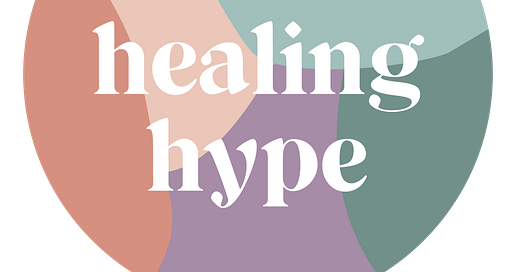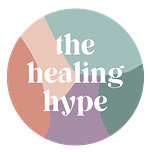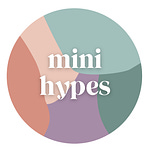Welcome to my first ever official advice column post! I am thrilled that today’s advice column is available for everyone to see. Going forward, this will be a perk for those that are part of The Healing Hype community, so subscribe monthly or annually here if you’d like to get and read more advice!
Dear Nisha,
I feel small and shameful after expressing a feeling that someone doesn't respond to well. Then I feel like I should hide and that I’m not not worthy after we make up. Can you help?
Thanks,
Hiding Myself
Dear Hiding Myself,
First, I want to commend you for expressing your feelings to someone who seems to matter to you. This is so very important, and it is so very hard when we live in a world that values our output more than our well being, our highlight reel more than our struggles, and our obedience more than our needs.
People have literally been burnt at the stake for expressing their feelings. Some have been murdered, abused, and so many are gaslit every day. To state your feelings and your needs can be revolutionary. And, for myself and other people who call themselves people pleasers, to state what we need feels like lifting up a volcano that is also erupting. It feels hot and shaky and heavy af. But you know that if you don’t say how you feel, the eruption will compound inside until a super-duper-mega-monstrous eruption is unleashed and nearly turns your insides out. And when this monster is unleashed, you get the idea that it is better to not stuff it down, no matter how hard it is to speak up.
I want you to remember one thing, Hiding Myself: how you feel is always the truth. If someone says you “shouldn’t” feel a certain way or that you simply don’t, they are saying how they feel, which has nothing to do with you.
I’ve been guilty of this. I’ve said, “You shouldn’t feel _______,” because, like so many others, I’ve been taught that “negative” feelings like sadness, anger, shame, and jealousy is “bad.” But to believe this is to deny our humanity. It erases the function of feelings. Our feelings are literally physical sensations that exist to save us. If someone disrespects you and you feel mad, your body is making sure that you know you are worthy. And if you feel shame even if you “made up” with someone after you’ve expressed your feelings, this means that your shame has a place and comes from a place. The other thing about shame is that it grows when it’s a secret. So thank you for sharing your shame with me and with this community. Thank you for letting it shift outside of your being so we can hold it for you. You deserve that, we all do.
The problem is that even if we know that we need to express ourselves, sometimes we still feel bad about doing it. This is especially true if we grew up in environments where we were the peacekeepers, and we kept the peace to the point of not knowing our own peace. To the point of losing sight of ourselves. And patriarchy says that those of us socialized as women are seen as “too emotional” so even if we express our needs, patriarchy says we shouldn’t need those needs.
So I want you to dig deep Hiding Myself. I want you to look beyond this relationship and think about another time you felt this way when you were with others. Maybe this is with an old friend or with a family member. When were your feelings denied? Who gave you a signal that you were unworthy? Which systemic structures confirmed this? How did you hide?
While you think about this, I’ll tell you about how I hid myself. When I was little, all I wanted to do was “be good.” I know this because I found a worksheet from first grade that says it. On this worksheet, there are three questions where I talked about it:
Is there anything you’d like to change about yourself? My answer: Be good.
What do you like best about yourself? My answer: Being good.
Did you ever wish you could be someone else? Why? My answer: Yes, so I can be really good.
Aside from being kind of cute, this also made me kind of sad. Actually, it made me very sad. Was I good? Did I want to be good? Would I ever be good? I wasn’t even seven years old, and I had completely lost confidence in my goodness. My guess is that I would, at any expense, try to alter myself to be good. Because, if I did this, it meant that I was accepted and liked and rewarded. And if I was accepted and liked and rewarded, then I had worth.
To achieve this worth, I would hide how I felt because how I felt wasn’t always believed. If my needs didn’t fit a scale of goodness, then I guess I didn’t need them. And this didn’t stop in first grade.
When I met my now ex-husband, he helped me move my IKEA dresser and broke a piece of it in the process. I expressed my shock when I saw the broken piece, and he proceeded to call me materialistic. He yelled at me and told me that I cared too much “things.” And I believed him because to be in a relationship with him, I had to twist my reality to fit his reality. And I did, for eight years, even though my body screamed otherwise. To “be good” in this relationship meant that I should subscribe to his philosophy. I shouldn’t have feelings about a “thing” being broken. In that moment, I hadn’t even wondered if he thought he was “good” after breaking someone else’s property. Someone being upset with me meant that I did something “bad.” I didn’t question his goodness because my goodness was deferential to everyone and everything else.
I let others measure my worth instead of realizing that I was born worthy. You were born worthy too, Hiding Myself. But at some point, someone or something told you that worth was something to be earned. And to earn it, you had to follow arbitrary rules that probably adhered to patriarchy and heteronormativity. And these rules have been passed down from one generation to the next, so we believed them.
Even though you expressed yourself and even though you made up, there’s a part of you that still has the “feel bads” for doing it, Hiding Myself. Maybe, even though you “made up” with this person, they said or implied something to diminish your worth. Maybe they didn’t, maybe they acknowledged their reaction, repaired it, and vowed to continue to improve. Maybe your “feel bads” are so conditioned that all the “feel goods” in the world won’t take them away. I don’t know which one it is, Hiding Myself. Maybe it’s both. That is for you to figure out.
All I know is that when you hide yourself, the world isn’t seeing this beautiful being who has so much to offer, especially when they talk about their feelings. Expressing your emotions and your needs is your responsibility. Yes, we need other people in our lives because we are social beings. But those people, the ones who try to see you as your already worthy self, and the ones who already do, will show up for you. If they can’t, if they won’t, or if they don’t know how, that’s okay. Because, Hiding Myself, you have the power to understand your needs and your feelings. You have the power to express them. You have the power to release your shame, expand yourself, and see your worth. You have the power to fill your life with humans who amplify your truth.
But it isn’t about arriving at this destination. It’s about understanding what has blocked you from moving past the “feel bads” and into the “worth its.” It’s about discovering this conditioning, unlearning it, and deeply knowing that to “be good” is to just be you.
I hope you can be you, Hiding Myself. I hope you can look in the mirror and say, “To be me, is to be whole. To be me, is to meet my needs. To be me, is to be free.” And I hope that if someone asks you if there’s anything you’d like to change about yourself, you laugh and answer that to change yourself means you feel bad about yourself, and while your answer might have been different before, you have nothing to apologize for anymore.
With love,
Nisha










Share this post